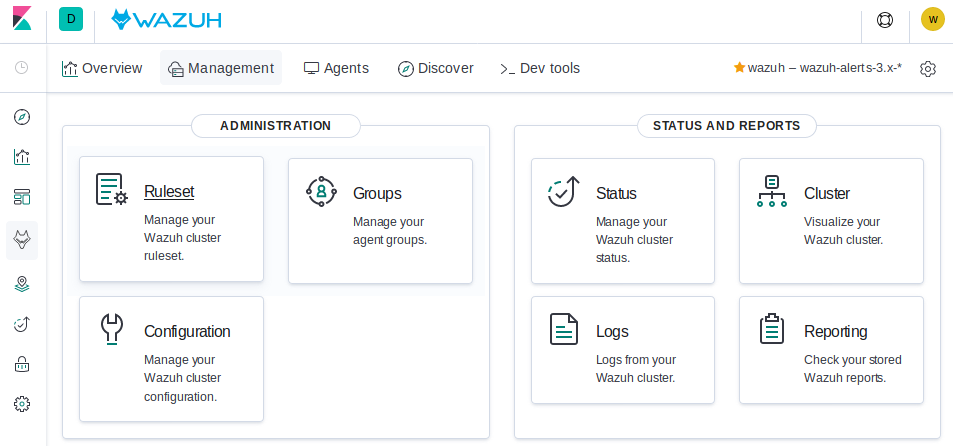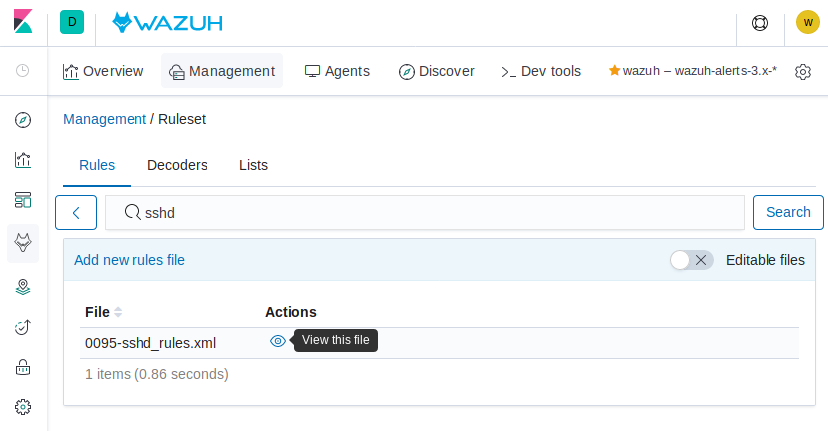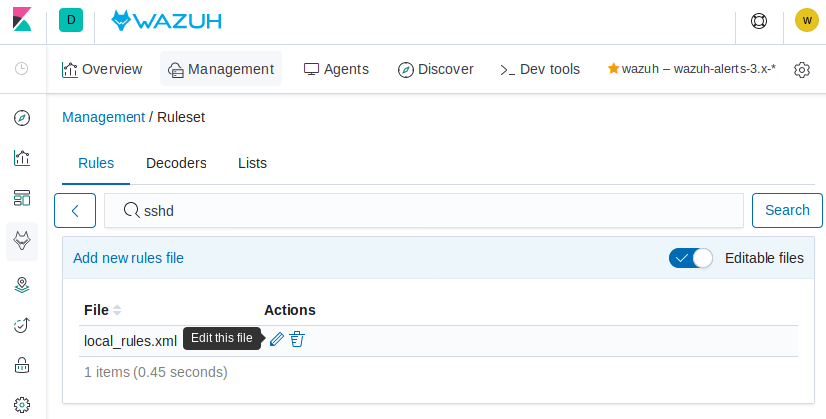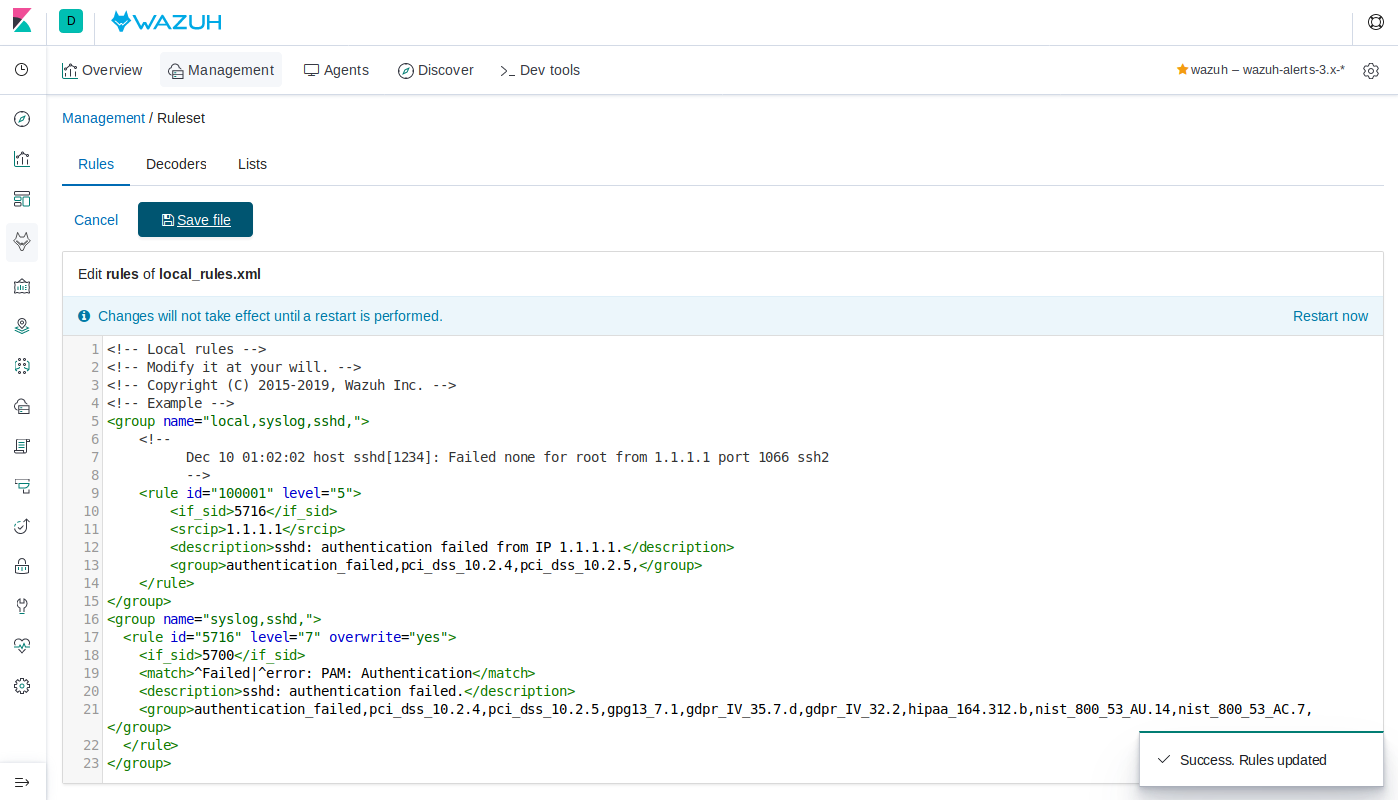Change the rules
The Wazuh Ruleset is maintained by Wazuh, Inc.
and is contributed to by the Wazuh community. These stock rules are located in various files
in /var/ossec/ruleset/rules/ on the Wazuh manager and should not be edited in that location
because they are overwritten when you upgrade Wazuh manager or perform a Wazuh Ruleset update.
Custom changes to the ruleset must be done within files in the /var/ossec/etc/rules/ folder.
In order to change a default rule, then the overwrite="yes" option must be used when declaring the rule.
In this lab you will raise the severity level of a specific rule in the Wazuh Ruleset. This can be achieved using the Web Interface or directly editing the files on the Wazuh Manager.
Using the Kibana Wazuh plugin
Open the Wazuh User Interface in Kibana, go into the Management Tab and select the Ruleset

Select Manage rules files and search for "ssh", then click on the eye icon next to 0095-sshd_rules.xml to view the contents of that file.

Scroll down to rule
5716and copy the text starting from where the<ruletag is opened until it is closed</rule>:<rule id="5716" level="5"> <if_sid>5700</if_sid> <match>^Failed|^error: PAM: Authentication</match> <description>sshd: authentication failed.</description> <group>authentication_failed,pci_dss_10.2.4,pci_dss_10.2.5,gpg13_7.1,gdpr_IV_35.7.d,gdpr_IV_32.2,hipaa_164.312.b,nist_800_53_AU.14,nist_800_53_AC.7,</group> </rule>
Click on Close, then toggle Editable files and click on the pencil icon next to
local_rules.xml

Paste the original rule within an existing set of
<group>tags or create your own. Then change the alert's level and specify that it overwrites the original rule:<group name="syslog,sshd,"> <rule id="5716" level="7" overwrite="yes"> <if_sid>5700</if_sid> <match>^Failed|^error: PAM: Authentication</match> <description>sshd: authentication failed.</description> <group>authentication_failed,pci_dss_10.2.4,pci_dss_10.2.5,gpg13_7.1,gdpr_IV_35.7.d,gdpr_IV_32.2,hipaa_164.312.b,nist_800_53_AU.14,nist_800_53_AC.7,</group> </rule> </group>
Notice how the web interface will automatically display an error if the xml syntax is not completely correct.
Press Save file, confirm and then click on Restart now.

After this is done attempt to log in to the linux-agent using SSH and incorrect credentials. Then look for the event on Kibana by searching for 5716 and you will see the the level of the alert for the most recent event will be 7:

Using the Command Line Interface
Log in to the wazuh-manager.
Copy existing rule 5716 from
/var/ossec/ruleset/rules/0095-sshd_rules.xml:<rule id="5716" level="5"> <if_sid>5700</if_sid> <match>^Failed|^error: PAM: Authentication</match> <description>sshd: authentication failed.</description> <group>authentication_failed,pci_dss_10.2.4,pci_dss_10.2.5,gpg13_7.1,gdpr_IV_35.7.d,gdpr_IV_32.2,hipaa_164.312.b,nist_800_53_AU.14,nist_800_53_AC.7,</group> </rule>
Paste it into
/var/ossec/etc/rules/local_rules.xml. Make sure to insert it before a the closing</group>tag, as all rules must be located inside of a<group>section.Change the level from "5" to "7" in your revised version of the rule.
Add the tag overwrite="yes" to the rule so that Wazuh knows you are replacing an already defined rule. The first line should now look like this:
<rule id="5716" level="7" overwrite="yes">
You could customize anything about the rule as long as you keep the rule id the same and include the overwrite tag. If you change the rule id then the original rule will not be overwritten and it may interfere with your customized version. If you leave the rule id the same but forget to add the overwrite tag, then Wazuh manager will fail the next time it is restarted and throw an error about a duplicate rule id.
Save your changes to
local_rules.xml.Run
ossec-logtestto test your customized rule and paste in this event that should trigger it:Oct 23 17:27:17 agent sshd[8221]: Failed password for root from ::1 port 60164 ssh2Observe your customized alert level near the end of the output:
**Phase 3: Completed filtering (rules). Rule id: '5716' Level: '7' Description: 'sshd: authentication failed.' **Alert to be generated.
Note
The Wazuh manager only reads in the rules when started or restarted, so any real events like above
would not be affected by your customized rule until you restart Wazuh manager. The ossec-logtest
tool does not require Wazuh manager to be restarted to notice your latest rule changes, which provides
you with a convenient way to test your rule changes before making them take effect on real events.